2009 Awardees
Arkansas
UAMS Center for Clinical and Translational Research
Little Rock, Arkansas
Principal Investigator
Curtis L. Lowery, M.D., University of Arkansas for Medical Sciences
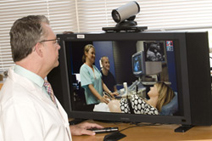
Curtis Lowery, M.D., chairman of the UAMS Department of Obstetrics and Gynecology, consults with a couple about their baby's ultrasound via a unique telemedicine program that is the first of its kind in the nation. Known as ANGELS (Antenatal & Neonatal Guidelines, Education and Learning System), the award-winning network links obstetric physicians at 40 sites around the state with UAMS maternal fetal medicine specialists. (UAMS Photo/Johnpaul Jones)
The University of Arkansas for Medical Sciences (UAMS) formed the Arkansas Center for Clinical and Translational Research (CCTR) to synergize clinical and translational research programs and revamp institutional research endeavors. CCTR unites UAMS' colleges and graduate school to establish an integrative center that transforms the pace, effectiveness and quality of translational research, resulting in better health for all Arkansans.
The goals are to educate tomorrow's physicians and scientists in collaborative translational science; develop partnerships with communities to assure that research benefits them and addresses their needs; champion innovation and collaboration in research and discovery to bring new technologies to Arkansans; and provide administrative structure that promotes productive interactions among basic science, clinical, health services and health policy researchers.
CCTR will foster the formation of a cross-disciplinary, multifaceted interface among the laboratory bench, patient bedside and broader community through an interactive network of scientists. The center will build on Arkansas' statewide telemedicine program to support community-based research efforts. UAMS is developing a new Division of Informatics to bring added value to Arkansas and represent a model program for research that extends to rural communities.
CCTR will facilitate the training of future clinical and translational investigators across health sciences and forge collaborations among researchers, community clinicians, clinical research networks, professional societies, industry and policymakers.
The ultimate goal of the Arkansas CCTR is to translate successful health care research projects directly to patient care delivery and assure that all Arkansans have access to the same state-of-the-art care — no matter where they live.
Florida
UF Clinical and Translational Science Institute
Gainesville, Florida
Principal Investigator
David Robert Nelson, M.D., University of Florida
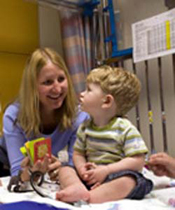
Dr. Jennifer Miller visits with a young patient who was involved in a clinical study at the University of Florida. (University of Florida Photo/Sarah Kiewel)
To speed the translation of basic science discoveries to early investigations in humans and the translation of clinical research into better medical practice and health care delivery, the University of Florida (UF) has invested in new research and training resources and restructured its traditional reporting, research and training operations to create the Clinical and Translational Science Institute (CTSI). The institute will provide the intellectual home for clinical and translational research and training, integrating and synergizing the scientific and educational activities of 12 colleges, two academic and clinical campuses, two regional health care systems and Florida's 67 counties.
CTSI aims to: 1) create an environment through which individuals from diverse disciplines can interact; resources, services and technologies can be identified and accessed; and local and regional barriers to collaborative research can be overcome; 2) train a workforce of clinical and basic science investigators, clinical trialists, laboratory technicians, study coordinators and other personnel required to establish and support multi- and interdisciplinary clinical and translational research teams; 3) enhance the quality and availability of cutting-edge technologies and novel research programs to accelerate discovery, development and application of diagnostic and therapeutic modalities; and 4) create opportunities for clinical scientists and Floridians to collaborate in advancing education and research into the causes, prevention, diagnosis, treatment and cure of human disease.
CTSI will enable UF to transform how it conducts multi- and interdisciplinary clinical and translational research and training and how it engages citizens across Florida in community-based participatory research, education, health care and health care delivery.
Illinois
UIC Center for Clinical and Translational Science
Chicago, Illinois
Principal Investigator
Larry Tobacman, M.D., University of Illinois at Chicago

John Hetling, associate professor in bioengineering, is working on a CCTS-funded study to produce the first human data from the multi-electrode electro-retinogram, which maps retinal health. (Roberta Dupuis-Devlin Photo)
The University of Illinois at Chicago (UIC) Center for Clinical and Translational Science (CCTS) will fundamentally alter clinical and translational investigation at UIC and our partnering institutions. Harnessing our diverse backgrounds, interests and expertise, CCTS will catalyze collaborative thinking and innovation. The center will organize, finance and house the infrastructure, expertise and resources for clinical and translational investigators within a single academic home, crossing administrative boundaries to harness and enhance existing UIC resources.
CCTS' goals: 1) Create and develop an academic home for clinical translational research at UIC that will provide a flexible, adaptable infrastructure to stimulate collaborative thinking, generative discourse and collective action, facilitating clinical and translational investigation. This will include establishing a robust pilot grant program, a Clinical and Translational Science Academy, a Web-based and geographic single point-of-access for investigators, and a matchmaking service to identify novel collaborations. 2) Establish the research service infrastructure (six cores) to provide research support services. 3) Provide multifaceted educational experiences for pre- and postdoctoral trainees, junior faculty and established faculty who want to extend their thinking beyond current disciplinary boundaries.
The administrative reorganization represented by CCTS will lead to rationalization and integration of significant and mature UIC resources for clinical translational research. CCTS will add to these resources to produce not only something different, but something better for clinical translational researchers and trainees at UIC and at partner institutions.
New York
Conduits, The Institutes for Translational Sciences at the Mount Sinai School of Medicine
New York, New York
Principal Investigator
Barbara T. Murphy, M.D., Mount Sinai School of Medicine
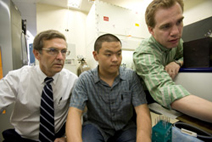
Hugh Sampson, M.D. (left), dean for translational biomedical sciences and the Kurt Hirschhorn Professor of Pediatrics at Mount Sinai School of Medicine, discusses the results of an experiment investigating the cellular mechanisms of peanut allergy. Joining him are student Steven Woo (center) and Wayne Shreffler, M.D., Ph.D. (right), assistant professor of pediatrics at Mount Sinai School of Medicine. (Matthew Septimus Photo)
The goal of Conduits, the Institutes for Translational Sciences at the Mount Sinai School of Medicine is to establish a research paradigm that will: 1) facilitate bench-to-bedside translation of cutting-edge research, 2) create an academic home for clinical and translational investigators, and 3) supply the governance and resources needed to allow clinical investigators to benefit from Mount Sinai's Translational Research Institutes and potential collaborators.
To accomplish this, Conduits will redesign its research infrastructure to integrate research functions across departments, enhance and promote interactions between basic scientists and clinical investigators, and streamline administrative procedures for new clinical trials and dissemination of results. It will establish a Translational Discoveries Program to provide consultation, oversight and facilities for clinical and translational research. Conduits also will engage the community and its affiliates to translate health benefits to the public. And it will develop methodologies to improve trial design and reduce participant burden.
To recruit and retain clinical and translational researchers, Conduits will train and support new investigators in a multidisciplinary, doctoral degree-granting program in clinical and translational research. It also will develop a recruitment program and enhance career development. An innovative Experimental Therapeutics & Technologies Program will identify and develop novel clinical and translational research projects and connect basic and clinical researchers, caregivers and laboratories through an integrated network of information.
Conduits will create an effective, efficient and centralized research administrative structure. It will foster and reward interdisciplinary collaborations, educate and retain new clinical and translational investigators and enable translation of basic scientific discoveries into clinical practice. Conduits also will deliver to its diverse community new therapies and an improved standard of care.
NYU/HHC Clinical and Translational Science Institute
New York, New York
Principal Investigators
Bruce Neil Cronstein, M.D., New York University
Judith S. Hochman, M.D., New York University

Gbenga Ogedegbe, M.D., M.P.H., M.S., as seen with his patient, is an associate professor of medicine in the Division of General Internal Medicine and director of the Center for Healthful Behavior Change at the NYU School of Medicine. Dr. Ogedegbe's research is focused on the translation and dissemination of evidence-based behavioral interventions targeted at cardiovascular risk reduction in minority and underserved populations in community settings and primary care practices. (Mike Weymouth Photo)
To transform the way research is carried out at New York University (NYU) and enhance the quality and productivity of the research effort, NYU and the New York City Health and Hospitals Corporation (HHC) has established a Clinical and Translational Science Institute (CTSI). CTSI aims to increase collaboration among clinical, translational and basic scientists across NYU to better determine the relevance and applicability of scientific advances to clinical problems. It also strives to provide leadership, infrastructure and resources to support novel science and the rapid, efficient and safe application of scientific discoveries to the community. A third aim is to support education, training and development of researchers who can conduct the investigations necessary to bring scientific advances to the public. Finally, CTSI works to enhance the ties between NYU researchers and the community in order to more rapidly identify health problems, investigate their scientific basis, apply the knowledge gained, promote use of new developments and evidence-based medicine by the community, and reduce health care disparities.
CTSI links NYU and the HHC in a new venture designed to bring their resources to bear on the health problems facing New York and the nation in the 21st century. Combining strengths and synergies in research, patient care and community outreach, it provides a new and innovative engine for translation of medical advances from the laboratory to the patient and from the patient to the community.
Ohio
University of Cincinnati
Cincinnati, Ohio
Principal Investigators
James E. Heubi, M.D., University of Cincinnati
Joel Tsevat, M.D., University of Cincinnati
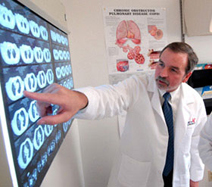
Frank McCormack, M.D., director of University of Cincinnati's (UC) pulmonary division, is an expert on the rare lung disorder lymphangioleiomyomatosis (LAM). Collaborative research at UC and Cincinnati Children's Hospital Medical Center already has led to major discoveries about the progression and treatment of LAM. This is just one example of successful translational research. (University of Cincinnati Photo/Dan Davenport)
The Center for Clinical and Translational Science and Training (CCTST) is transforming the research environment among the University of Cincinnati and its affiliated partners in the community and industry. CCTST will coordinate and plan the overall direction of the university's research infrastructure and training opportunities; serve investigators' needs from project concept to completion; optimize skills and foster career development of both new and experienced investigators; and ensure that community input informs research processes, and that the university's discoveries are translated to the community.
Through Research Central, researchers will have easy access to centralized study design, biostatistical, bioinformatics, regulatory and community engagement support. The new Pilot & Collaborative Studies core will expand the pilot funding program at Cincinnati Children's Hospital Medical Center to the entire university. Greatly expanded educational offerings, including a new Certificate in Clinical and Translational Research, will be developed, building on the success of the Dean's Scholars in Clinical Research, as well as a master's degree in Clinical and Translational Research program.
Through the community engagement program, CCTST will further bidirectional research linkages with the local community, breaking down bureaucratic barriers by creating Institutional Review Boards that can coordinate community-based research. Expanding services, such as nursing/coordinator support and sample processing provided by the existing General Clinical Research Center and the Cincinnati Department of Veterans Affairs Medical Center, will promote patient-oriented research for populations in the community.
New translational technologies, including proteomics, drug discovery, imaging, nanomedicine, gene transfer and stem cell biology, and translational and molecular disease modeling, will be made more accessible to researchers.
South Carolina
South Carolina Clinical and Translational Research Institute
Charleston, South Carolina
Principal Investigator
Kathleen Theresa Brady, M.D., Ph.D., Medical University of South Carolina
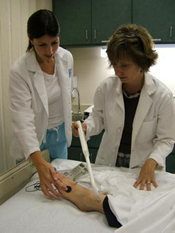
Teresa Kelechi, Ph.D., R.N. is a board-certified gerontological clinical nurse specialist and a certified wound care nurse. Dr. Kelechi's translational research involves the use of infrared thermometry to detect the potential for stasis ulcer development in individuals with chronic venous disorders, and she is developing a "smart sock" clinical intervention to prevent and treat venous leg ulcers. (Medical University of South Carolina Photo)
The goal of the South Carolina Clinical and Translational Research Institute (SCTR) is to create a sustainable home at the Medical University of South Carolina to advance clinical and translational research as a distinct discipline and facilitate collaboration across other disciplines. The overall approach focuses on implementing advances in biomedical science to create opportunities for discovery; removing barriers to link knowledge, experience and expertise across disciplinary boundaries; providing training and mentoring experiences for clinical and translational researchers with diverse training and backgrounds; and fostering community engagement with a rapidly growing underserved population to improve health outcomes and research participation.
Joining the national CTSA consortium will accelerate progress by facilitating: 1) development and interoperability of biomedical informatics systems; 2) active exchange of best processes and practices in evidence-based medicine and community engagement; 3) advancement of clinical and translational science as a discipline and career path; and 4) shared knowledge, experience and collective influence in setting regional and national research agendas and health policy designed to generate the transformative results envisioned by the NIH Roadmap.
SCTR will bring together scientists, clinicians and the lay community to address diseases that commonly impact the citizens of South Carolina. SCTR will coordinate resources and expertise statewide in efficient, innovative approaches to research. Through SCTR, a new generation of researchers will be trained to work across multiple disciplines in collaboration with community members so that scientific discovery is relevant to the public.
Texas
Institute for Translational Sciences at UTMB
Galveston, Texas
Principal Investigator
Allan R. Brasier, M.D., University of Texas Medical Branch
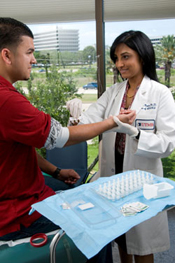
UTMB physician Meera Gupta's translational research interests include transplant immunology, particularly the mechanisms of graft tolerance and rejection. She also has clinical interests in solid organ transplantation and cystic fibrosis. UTMB's Institute for Translational Sciences is composed of eight multidisciplinary teams formed around a diversity of topics. (UTMB Photo/John Glowczwski)
The University of Texas Medical Branch (UTMB) at Galveston, through its Clinical and Translational Science Award (CTSA), seeks to facilitate translational research as a rigorous discipline, develop translational research training programs at all levels in the graduate continuum, effectively conduct and bridge step one translational research to steps two and three, and interface productively with the national CTSA consortium. In particular, this CTSA helps UTMB to build teams of researchers with diverse skills who can work effectively toward positive health outcomes. These teams also serve as exemplary learning environments for the next generation of translational investigators. Training activities include a Clinical and Translational Scholars program, an Academy of Mentors, a seminar series and team training workshops.
The CTSA is administered by UTMB's Institute for Translational Sciences (ITS), which facilitates many aspects of translational research and support at the university, enhancing researchers' ability to quickly and effectively translate basic science discoveries into improvements in human health. ITS' operations are guided by three overlying principles: 1) proactively identifying new team-oriented research opportunities; 2) prioritizing trainee involvement in a team-based culture; and 3) integrating systems biological approaches into translational research. Through the CTSA, ITS has organized 12 key resources — combinations of university core laboratories and intellectual resources, integrated by a single point of investigator/trainee contact. Key resources are designed to respond to the needs of investigators and trainees and to break down communication, technology and regulatory barriers, thereby transforming how UTMB conducts patient-oriented research.
Social Media Links